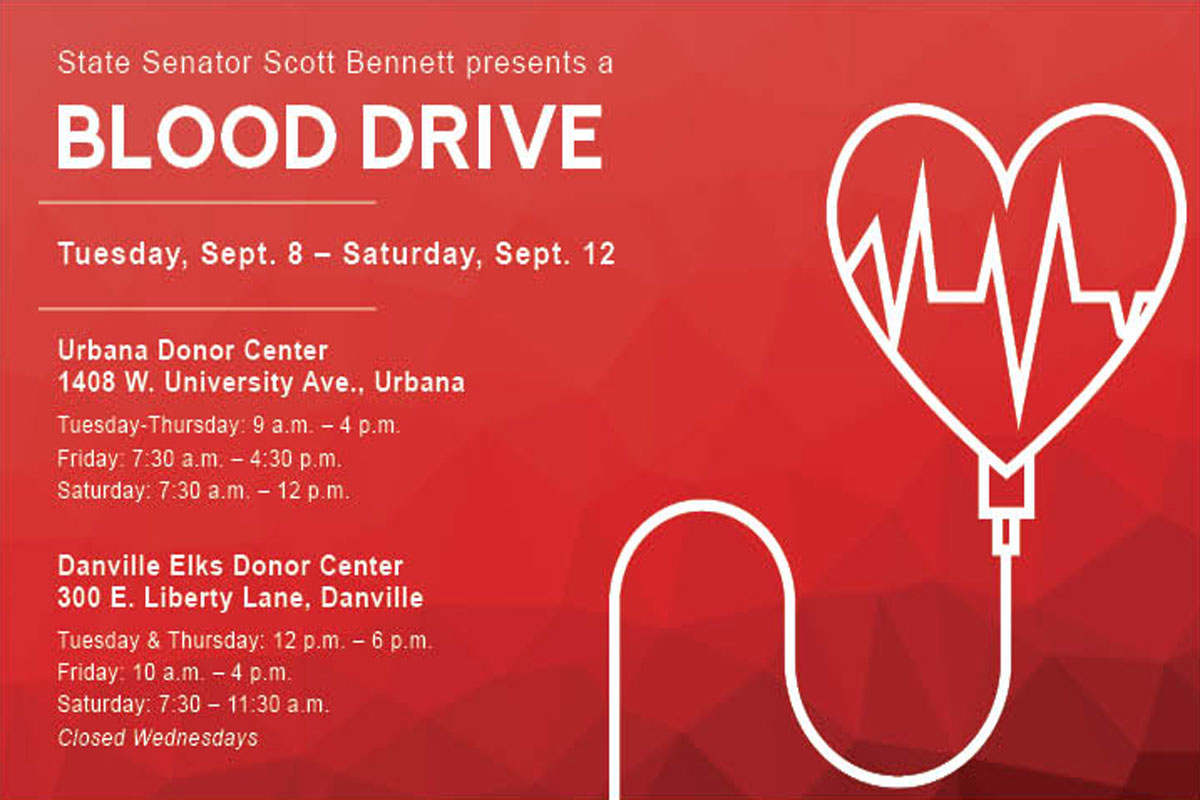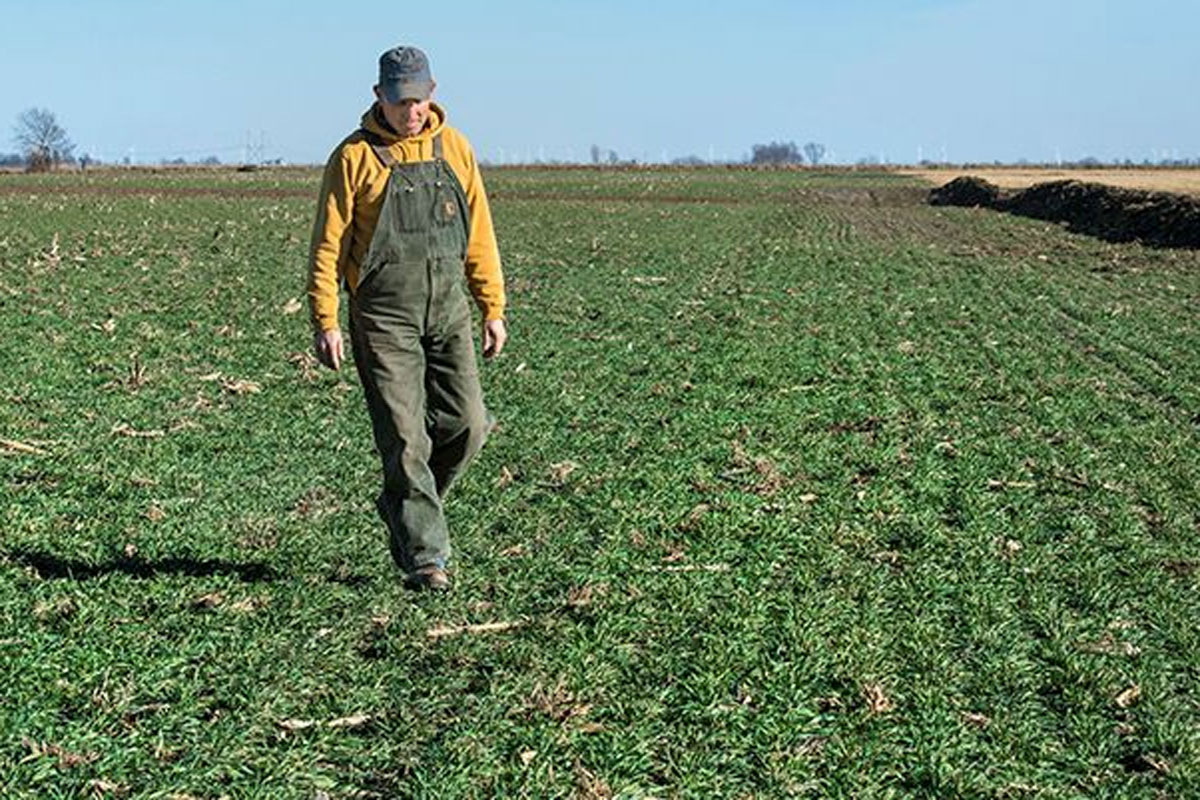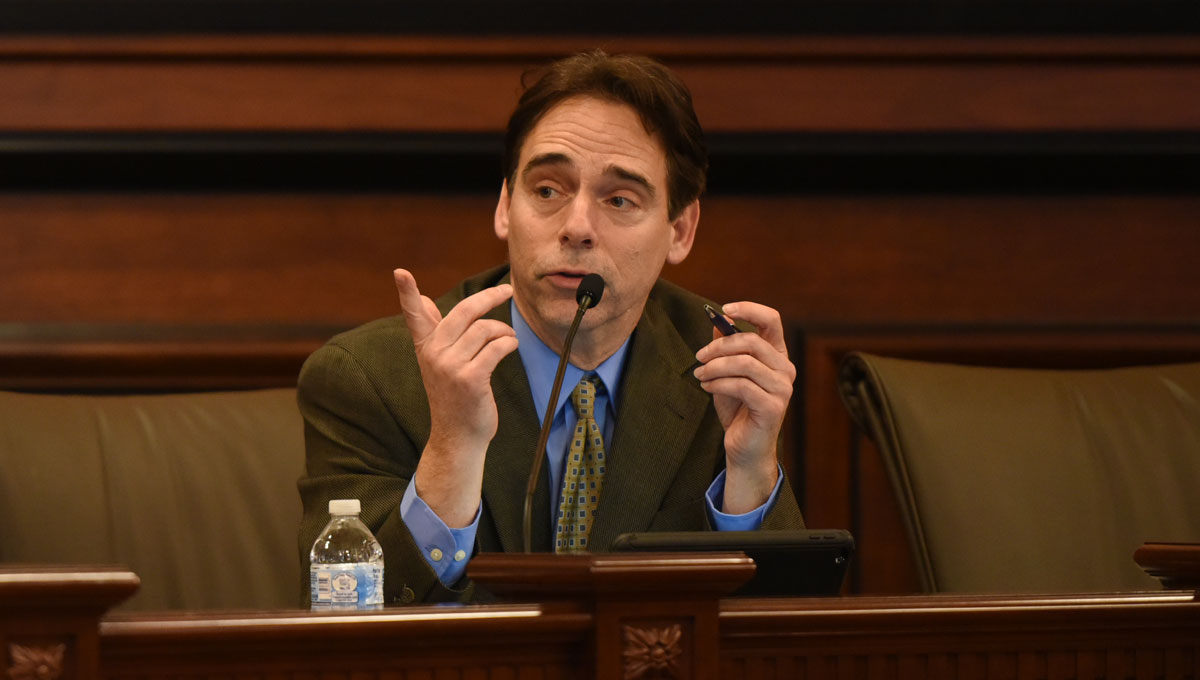- Details
- Category: Senator Andy Manar News
 SPRINGFIELD – Senate Agriculture Chairman Scott Bennett (D-Champaign) and State Senator Andy Manar (D-Bunker Hill) are inviting area farmers to apply to the Illinois Department of Agriculture’s “Fall Covers for Spring Savings” cover crop program to receive a discounted crop insurance rate in spring 2021.
SPRINGFIELD – Senate Agriculture Chairman Scott Bennett (D-Champaign) and State Senator Andy Manar (D-Bunker Hill) are inviting area farmers to apply to the Illinois Department of Agriculture’s “Fall Covers for Spring Savings” cover crop program to receive a discounted crop insurance rate in spring 2021.
“I’m thrilled to see this program return after seeing a lot of success in its inaugural season,” Bennett said. “This program serves as an important tool to help farmers as they increase cover crop acres beyond what might be eligible for other state and federal programs.”
Bennett and Manar worked closely with the Department of Agriculture last year to develop the program, which allows eligible applicants to receive a $5 per acre premium discount on the following year’s crop insurance invoice for every acre of cover crop enrolled and verified in the program.
“The Fall Covers for Spring Savings Program has given our farmers the chance to make additional long- term investments in the health of the finest soil in the world,” Manar said. “By continuing to prioritize this program in this year's state budget, Illinois will remain an agricultural standard bearer for decades to come."
- Details
- Category: Senator Scott Bennett News
 CHAMPAIGN – To help address the state’s blood supply shortage, State Senator Scott Bennett (D-Champaign) is calling on healthy, eligible donors to donate blood at two upcoming blood drives taking place next week in Urbana and Danville.
CHAMPAIGN – To help address the state’s blood supply shortage, State Senator Scott Bennett (D-Champaign) is calling on healthy, eligible donors to donate blood at two upcoming blood drives taking place next week in Urbana and Danville.
“The need for blood is greater than ever, and these drives are an effort to help meet the current demand for blood donations,” Bennett said. “If you are healthy and able, your participation is critical to help save lives during this ongoing public health crisis.”
The blood drives will take place Tuesday, Sept. 8 through Friday, Sept. 11 at the Urbana Donor Center, located at 1408 W. University Ave. in Urbana, and the Danville Elks Donor Center, located at 300 E. Liberty Lane in Danville. Donation hours at the Urbana location can be found here, and Danville here.
 Donor centers are following recommendations from local, state and federal health agencies to keep staff, volunteers and donors safe. Appointments and masks will be required, and chairs in all areas will be at least six feet apart.
Donor centers are following recommendations from local, state and federal health agencies to keep staff, volunteers and donors safe. Appointments and masks will be required, and chairs in all areas will be at least six feet apart.
Healthy and eligible candidates can schedule an appointment to donate in Urbana at https://ilsendems.co/C-UBloodDrive or in Danville at https://ilsendems.co/DanvilleBloodDrive. All presenting donors will receive a voucher for a $10 gift card to a location of their choice, which can be redeemed through Sept. 20.
For more information, Bennett urges residents to contact his Champaign office at 217-355-5252 or his Danville office at 217-442-5252. Those with questions can also visit his website, SenatorBennett.com.
- Details
- Category: Senator Kimberly A. Lightford News
 CHICAGO –Senate Majority Leader and Chair of the Illinois Legislative Black Caucus Kimberly A. Lightford (D-Maywood) joined colleagues at the Westside Justice Center on Tuesday to announce a plan to build a legislative agenda that addresses systemic racism in Illinois.
CHICAGO –Senate Majority Leader and Chair of the Illinois Legislative Black Caucus Kimberly A. Lightford (D-Maywood) joined colleagues at the Westside Justice Center on Tuesday to announce a plan to build a legislative agenda that addresses systemic racism in Illinois.
“We have an opportunity to leverage this moment to make sure other Black women, Black mothers and Black wives just like me can truly have peace, justice and hope for our future, knowing that our children and our grandchildren will not share the same kind of life experiences that everyone in my generation and generations before me have had to endure,” Lightford said.
Read more: Lightford, Black Caucus to build a Black agenda through four pillars
- Details
- Category: Senator Patrick Joyce News
 PARK FOREST – State Senator Patrick Joyce (D-Essex) is encouraging area farmers to apply to the Illinois Department of Agriculture’s “Fall Covers for Spring Savings” cover crop program to receive a discounted crop insurance rate in spring 2021.
PARK FOREST – State Senator Patrick Joyce (D-Essex) is encouraging area farmers to apply to the Illinois Department of Agriculture’s “Fall Covers for Spring Savings” cover crop program to receive a discounted crop insurance rate in spring 2021.
“This is a very exciting program that can benefit soil health and protect water quality on and around our farms,” Joyce said. “I strongly encourage local farmers to take this program into consideration when making their fall planting decisions.”
The program allows eligible applicants to receive a $5 per acre premium discount on the following year’s crop insurance invoice for every acre of cover crop enrolled and verified in the program.
The goal of the program is to encourage farmers to plant additional acres of cover crops that are not covered by other state or federal incentives.
“Cover crops are a great way to keep soil anchored, salvage nitrogen, capture carbon and create weed suppression,” said Jerry Costello II, Acting Director of Agriculture. “In the long run, cover crops will help Illinois farmers reduce the need for fertilizer and reach the goals of the Nutrient Loss Reduction Strategy.”
Any farmer with coverage through the U.S. Department of Agriculture Risk Management Agency crop insurance program is eligible to apply.
Applications will be available in December on the Illinois Department of Agriculture website. For questions or additional information, contact the department at (217) 782-6297.
- Details
- Category: Senator Linda Holmes News
 Aurora, Ill. - If you may have been exposed to someone with COVID-19, getting tested is critical, says Senate Assistant Majority Leader Linda Holmes (D-Aurora).
Aurora, Ill. - If you may have been exposed to someone with COVID-19, getting tested is critical, says Senate Assistant Majority Leader Linda Holmes (D-Aurora).
“Scientific studies show even those without symptoms have been linked to virus spread, so testing is vital, particularly for those who believe they may have been exposed,” Holmes said. “To get this pandemic under control, we need as much information as possible on who is transmitting the virus.”
Widespread testing is a key component of the Illinois Department of Public Health’s strategy to combat COVID-19. Since March, Illinois has tested more than 3.8 million COVID-19 specimens and expanded testing to all parts of the state.
“In the face of increasing infections, we need to promote more testing, not less, to identify new cases and interrupt further transmission,” said IDPH Director Dr. Ngozi Ezike last week.
Dr. Ezike encourages testing for any resident who thinks they may have been exposed, whether or not they are experiencing symptoms. She recommends waiting 5-7 days from exposure to get tested.
Despite a recent change in federal guidelines, IDPH continues to advise testing for anyone who comes into close contact with a confirmed case to ensure people are not spreading the virus unknowingly to others, especially to those with underlying medical conditions that put them at greater risk of complications from COVID-19.
According to IDPH, there are nearly 300 testing sites in Illinois, including 11 state-operated sites and 12 mobile testing teams. Testing is free at state-operated sites and several other
locations. More information about locations, hours and requirements can be found at http://www.dph.illinois.gov/testing.
- Details
- Category: Senator Scott Bennett News
 CHAMPAIGN – Senate Agriculture Chairman Scott Bennett (D-Champaign) is inviting area farmers to apply to the Illinois Department of Agriculture’s “Fall Covers for Spring Savings” cover crop program to receive a discounted crop insurance rate in spring 2021.
CHAMPAIGN – Senate Agriculture Chairman Scott Bennett (D-Champaign) is inviting area farmers to apply to the Illinois Department of Agriculture’s “Fall Covers for Spring Savings” cover crop program to receive a discounted crop insurance rate in spring 2021.
“I’m thrilled to see this program return after seeing a lot of success in its inaugural season,” Bennett said. “This program serves as an important tool to help farmers as they increase cover crop acres beyond what might be eligible for other state and federal programs.”
Bennett worked closely with the Department of Agriculture last year to develop the program, which allows eligible applicants to receive a $5 per acre premium discount on the following year’s crop insurance invoice for every acre of cover crop enrolled and verified in the program.
The goal of the program is to encourage farmers to plant additional acres of cover crops that are not covered by other state or federal incentives.
“Cover crops are a great way to keep soil anchored, salvage nitrogen, capture carbon and create weed suppression,” said Jerry Costello II, Acting Director of Agriculture. “In the long run, cover crops will help Illinois farmers reduce the need for fertilizer and reach the goals of the Nutrient Loss Reduction Strategy.”
Any farmer with coverage through the U.S. Department of Agriculture Risk Management Agency crop insurance program is eligible to apply.
Applications will be available in December on the Illinois Department of Agriculture website. For questions or additional information, contact the department at (217) 782-6297.
- Details
- Category: Senator Kimberly A. Lightford News

CHICAGO—The Illinois Legislative Black Caucus is developing a legislative agenda to help Black communities in Illinois overcome centuries of oppression.
Recent events, including the COVID-19 pandemic and persistent police killings, have highlighted staggering disparities that have made it clear that comprehensive reform is crucial to end systemic racism.
ILBC Chairman Kimberly A. Lightford (D-Maywood) says the caucus seeks to bring justice to Black Illinoisans.
“African Americans have been held down by systems of oppression since our ancestors were enslaved 400 years ago,” Lightford said. “We are still enslaved, shackled by unemployment, police brutality and a severe lack of resources. The Black Caucus seeks to uplift our communities by demanding fair treatment from our institutions and finally receiving fairness and justice.”
Read more: Black Caucus seeks to develop agenda to overcome centuries of oppression
- Details
- Category: Senator Steve Stadelman News
 ROCKFORD – With only weeks left before the U.S. Census Bureau finishes its counting efforts, State Senator Steve Stadelman (D-Rockford) is stressing the importance of Winnebago County residents being counted by filling out the 2020 Census, which will protect their representation in government and share of federal funding.
ROCKFORD – With only weeks left before the U.S. Census Bureau finishes its counting efforts, State Senator Steve Stadelman (D-Rockford) is stressing the importance of Winnebago County residents being counted by filling out the 2020 Census, which will protect their representation in government and share of federal funding.
“The census is one of the primary tools the federal government uses to decide how much money will be given to the Rockford area,” Stadelman said. “Filling out the census has never been easier with the new online questionnaire option. It took me 10 minutes to fill out for my entire family.”
So far this year, Rockford’s self-response rate is down, currently only at 67.7%. As of Aug. 28, Winnebago County’s self-response rate is currently 73.7%. More than half of the county’s residents’ responses have been submitted online.
“If Rockford is undercounted, it will receive less money, less representation and less influence across the state and country,” Stadelman said. “It’s our job to make sure we’re all counted.”
Although online is the quickest way to fill out the questionnaire, there are three ways you can respond: online, by phone or by mail. Stadelman also pointed out that higher self-response rates mean fewer individuals are likely to receive visits from census surveyors to be counted in-person. This year, census surveyors are putting the health of themselves and their families at risk from COVID-19.
If someone hasn’t filled out their census questionnaire yet, they can visit 2020census.gov, where they can find the online questionnaire and additional information about the census. You can see local responses rates across Illinois and the entire nation here.
More Articles …
Page 611 of 743












 © 2025 Illinois Senate Democratic Caucus
© 2025 Illinois Senate Democratic Caucus